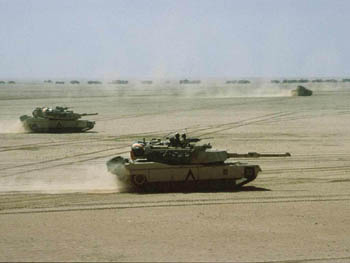![[Metroactive News&Issues]](/gifs/news468.gif)
[ Santa Cruz Week | SantaCruz Home | Archives ]
Watching Baghdad Burn
Keeping up with the war via MSNBC
By James D. Houston
It is the first day of spring, 2003, and Baghdad is burning. The Defense Department calls it "Shock and Awe." You deliver so many bombs, stir up so much flame and mayhem, the leaders of the other side realize there's nothing else to do but quit. That is the operational theory. So here they come, 320 cruise missiles dropped through the night sky into a stretch of six kilometers along the Tigris River. And right there next to the spectacle on the screen, just underneath the billowing explosions, the smoke and the fire, the Dow Jones Industrial Averages are ticking away, steadily climbing as the devastation spreads.
This is the pre-emptive strike Kofi Annan and numerous other leaders around the world say is a violation of international law. This is the military invasion of a country that has yet to do anything to us. Though the polls say nearly half the people in the U.S. believe Saddam Hussein was behind the 9/ll attack on the World Trade Center, no one has produced any evidence to support that belief. Our own CIA refutes it. There is no question that Saddam has been a brutal dictator (a fact that didn't bother us until he crossed the wrong border; until l99l he was "our" dictator). No question that he is a deceptive scoundrel who has ruled by fear and ruthless intimidation. But what kind of solution is this? The most expensive and sophisticated military machine ever assembled on the planet Earth is being aimed a country slightly larger than California, and where half the population is under 15 years of age. Whose brutality is being revealed here today? Whose weapons of mass destruction are on display?
And why--as the companion track to these hellish scenes--do the Dow Jones averages continue to click along, down there in the lower right-hand corner of the screen?
While it's near midnight in Baghdad, it's midday on Friday here in the U.S., so the market is still open. But on a day like this, given what we're watching, given the many frightful implications of these flames rising from an Arab city of some 5 million people, I can think of several other types of data that the network news might offer to viewers as a running sidebar of relevant information. Weather forecasts from the neighboring regions of the Middle East could be very handy, or the ongoing numbers of casualties, as they occur--civilian as well as military, Iraqi as well as British and American. Or the sites of protests being mounted around the world, in Rome and Cairo and Beirut and London and Jakarta and San Francisco, with a running scroll that estimates the numbers of protestors globally at any given moment, the numbers of arrests, the numbers of police in riot gear who have been called away from other duties to deal with the surging multitudes; or some names and numbers for agencies one might contact if you wanted to do something on behalf of the people whose city is being bombed.
But numbers like these will appear infrequently and be less specific. We're not supposed to dwell on them too long. The screen tells us that, of all the numbers hovering around this wreckage, the ones we want to watch first are found in the moment-to-moment tracking of the Dow. And there is no great mystery about why.
Take those 320 cruise missiles. They will have to be replaced. At 1 million dollars each, that's a $320 million contract for Raytheon right there in the first night's bombing. Consider the destruction done by those missiles, and the buildings, roads and sewer lines that will have to be restored. In the first big Wall Street rally after President Bush announced that Saddam had 48 hours to abdicate, one of the fastest- gaining stocks was Caterpillar, whose bulldozers and backhoes are sure to be in great demand.
Halliburton is already on the ground in Kuwait, in Turkey and in Afghanistan, via its engineering subsidiary Brown and Root. In November 200l, they secured a 10-year megadeal with the Pentagon to provide logistic support to military operations, for a profit, anywhere in the world.
Brown and Root already has a Pentagon contract to control oil fires wherever Iraq's well heads are set ablaze. Somebody has to do that kind of work, of course. Still, one can't help but wonder if there were other candidates for these tasks besides a subsidiary of the corporation Dick Cheney ran before he became vice president and from whom he continues to receive each year a hefty chunk of delayed severance pay.
Our bombs blacken the sky over Baghdad, while in the corner of the screen the numbers keep rolling, like lemons and cherries turning on their rollers in a slot machine. These two tracks play together, charting the progress of an infamous day: the relentless rain of weaponry, the billowing smoke, the fires reflected in the waters of the Tigris, the Shock and the Awe, side by side with the NASDAQ, the S&P 500. Somewhere offscreen the casualty rate is already beginning its climb, but we don't see that yet. The screen reminds us to keep our eyes on the fortunes of the Dow, up 235 points when the market closes, to cap the biggest one-week gain in 20 years.
Copyright © Metro Publishing Inc. Maintained by Boulevards New Media.
![]()

Tanks for the Memories: Television is providing lots of images of the war--but how much real information?
From the April 2-8, 2003 issue of Metro Santa Cruz.